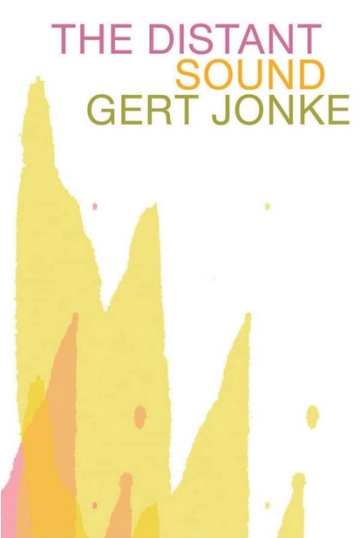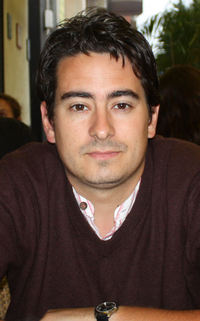THE DISTANT SOUND - Gert Jonke
So I see myself as a sort of subject that I am observing, as someone walking along beside me, and I'm starting to have thoughts about my new companion, such as he is.
Gert Jonke opens The Distant Sound with a delightfully lyrical, neurotically brilliant, yet utterly baffling lament. Greeted with such an enticingly cluttered and self-involved prosaic, one is aware from the outset of the author's mocking presence within the novel – Jonke has us and will continue to menacingly jab our sides throughout. Published by Dalkey Archive Press, The Distant Sound is the Austrian author's fifth work to receive an English translation; the second part of a loose trilogy that began with Homage to Czerny: Studies in Virtuoso Technique, also available in translation from Dalkey. The publication arrives a few months shy of the second anniversary of Gert Jonke's death. He died of pancreatic cancer in January 2009, aged 62.
The Distant Sound is a novel that deliberately lacks structure. There are no chapters. There is little punctuation. The reader is guided only by a nameless composer's tireless series of thoughts, observations and protracted conversations, all of which frequently descend into the half-interested prattle of a lunatic. A sustained plot occasionally appears, but the narrator does not follow it with any enthusiasm. What we are left with is an energetic three hundred page ramble – but a marvelous one. The premise is loose and of no real importance: A composer awakes in an insane asylum, having been told that he recently attempted suicide. The reasons given for this are vague; all we know is that the once respected composer has an obsession with capturing the perfect sound, one that persistently plays distantly in his scattered mind. Incarcerated in the asylum, the narrator meets a female employee (referred to as “SHE”) - a student of music herself, one who admires his past compositions. Striking up a friendship, our narrator soon falls in love. Though taking over a third of the novel to establish this insipid relationship, the book's only significant plot change occurs when “SHE” suddenly ceases to work at the asylum. Our composer, questioning his need to be held against his will, escapes and sets off in search of his elusive love.
Post-escape, the novel becomes increasingly captivating. This is owed to the number of colourful characters the composer meets on his adventure; most importantly, members of a travelling ‘natural' theatre troupe, with whom he shares a train journey. Those familiar with Franz Kafka's Amerika will share my delight, as on this journey the composer observes the troupe's two engineers - Giacomo and his master, Karl Rossmann. It is a dream-like landscape, but it belongs to an intellectual.
The reader is also confronted with scathing social commentary. The city's river, for instance, will be drained to create space for more housing; and while in Homage to Czerny Jonke commented on the upper classes, in this novel his attention turns to the provincial. As the train takes the composer out of the capital city to a rural location, we are transported to a variation of Galicia, and here Jonke is at his most caustic and humorous: “half-wild crazy inhabitants of the plain have been suffering from lack of wood, in spite of the hot season.”Yet away from the city – an overpopulated insular world where everyone's face is covered by a raised newspaper – the composer is able to make sense of what happened to him:
The longer you listen, the more strongly you feel that the sounding of the landscape is the introductory music to a fascinating annihilation you have almost wished for. It's the overture to the stunning beauty of a doom you have hoped for, when a hissing glissando will flash across the plain. You have longed for the exciting, moving destruction of nature by itself, and it will now continue destroying itself until the people have disappeared out of it. Then, freed from human beings, it can make a new beginning...
The composer's own suicide is bound to the self-destructive nature of the human world surrounding him. It is amidst such destruction that Jonke is at his most brilliant. Himself a conductor of serene lyricism, a language that weaves human introspection with an imploding environment, such flare ensures that the smallest calamity – from a mirror smashing to a cupboard collapsing – has the same resonance with reader as a nuclear explosion. A notable final scene of the novel takes place in a village square. Continuing his search for the elusive “SHE”, the composer witnesses a paper revolution: the villagers throw governmental papers above their heads. It serves as a more powerful metaphor for human failings than any blood-drenched coup could.
Not knowing much about Gert Jonke, I was swiftly struck by the utter uniqueness of his form. Translator, Jean M. Snook, who won the Austrian Cultural Forum's Prize for Translation in 2009, must be congratulated in managing to capture Jonke's playful spirit. The Distant Sound is not a simple read – time and perseverance must be invested. At times, Jonke's purposeful commitment to avoid producing a conventional novel can grow tiresome. However, such is the force of Jonke's words that from a fantastical landscape, littered with paradox, an almost Horatian satire emerges – one that will not be easily forgotten.
 Gert Jonke was born in Klagenfurt, Austria, in 1946. He was the author of more than seventeen books, five of which have been translated into English. He died in 2009.
Gert Jonke was born in Klagenfurt, Austria, in 1946. He was the author of more than seventeen books, five of which have been translated into English. He died in 2009.

 Richard Jackson is a PhD candidate and freelance writer from the UK. He enjoys writing about Central and Eastern Europe and has submitted articles to journals such as Transitions Online and Literature Across Frontiers. He manages and writes for the website ‘Lemberik' –
Richard Jackson is a PhD candidate and freelance writer from the UK. He enjoys writing about Central and Eastern Europe and has submitted articles to journals such as Transitions Online and Literature Across Frontiers. He manages and writes for the website ‘Lemberik' –